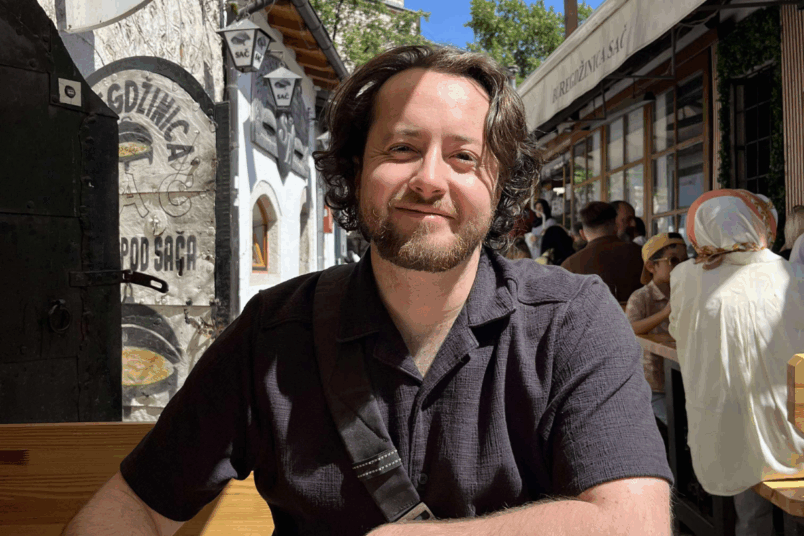If you’re interested in pursuing a career in social work, like John, apply to Approach Social Work today.
30 October 2025
Finding balance: living and working with ADHD in Social Work

October is ADHD Awareness Month: an occasion to reflect, raise awareness and challenge misconceptions around neurodiversity.
Social worker John Shaw, who works with looked-after children in Middlesbrough, knows firsthand both the challenges and the less commonly-mentioned advantages of living with the disorder. Diagnosed while still at university, he has since learned to manage the condition within the fast-paced and emotionally demanding environment of social work.
As a child, John often felt misunderstood.
“Everyone just assumed that because I could speak quite well and had good general knowledge and because I wasn’t failing any subject, everything was fine”, he adds.
Everything changed in 2020, at the peak of the Covid-19 pandemic. Still in law school, John saw his grades slipping and found it increasingly difficult to stay engaged, attend lectures and meet deadlines. After seeking professional advice, ADHD came into the picture and a series of assessments followed, leading to an official diagnosis.
“They assessed me and found I had combined-type ADHD with aspects of masking as well, which is probably why it wasn’t picked up before.”
The diagnosis helped him make sense of the challenges he had faced over the years. After moving from law to social work, John began to think more consciously about how to cope with the difficulties and channel the strenghts to make a positive difference in his work.
Challenges for a social worker with ADHD
Since joining Frontline’s programme in 2023, John has discovered both the demands and the rewards of social work. Like many of his peers, his workdays are filled with visits to families and children, long hours on the phone and back-to-back meetings.
Short-term memory and time blindness are among the biggest obstacles. For a brain that processes information quickly but inconsistently, details can blur together after a meeting or visit and recalling information in the right order can be difficult.
“After a visit or a meeting, there’s just so much information that it can all merge together,” he says. “I might forget certain actions or remember them in the wrong order.
I think sometimes we, people with ADHD, to our own detriment will fill in the gaps of what we think people have said and it ends up being an issue because they didn’t actually say it like that. I’ve learned to write things down as soon as possible, to avoid this.”
Trying to keep track of so much information has made him notice how his focus works – intense, sustained and sometimes draining.
“When I do get focused, I can get into a rhythm – I’m unstoppable for a while, but it takes a lot out of me,” he says. “It’s about finding that balance between working at full speed and knowing when to slow down.”

From structured calendars to transcription software and taking notes during meetings, John has found his own ways to overcome the barriers he faces. These practical tools help turn what could be a limitation into a strength.
While personal solutions make a real difference day-to-day, he also recognises that external factors – particularly the level of understanding from managers – can make a significant impact on how well someone with ADHD thrives at work.
Misunderstandings and support at the workplace
“Some managers hear the word ADHD and panic,” John says.
In his still burgeoning career in social work, he has encountered both supportive managers who took the time to understand him and those whose lack of awareness did more harm than good.
“It didn’t feel like they were listening to me. They had heard what ADHD was and thought they knew best for me. I found that so difficult, and it really damaged our relationship… I couldn’t be honest with them.”
What makes the biggest difference, he says, is not a list of adjustments but the willingness to listen. Each person experiences ADHD differently, and what helps one may not help another. Generic measures based on textbook definitions rarely provide real support.
“Listen to the person with ADHD – what is it that they struggle with specifically, what are they saying that they find difficult – and then try to find a support package that works around that.”
Applying generalised measures doesn’t work, he adds, because ADHD is shaped by each person’s experiences, environment and background.
“I wish that more people understood that while it comes with its difficulties, it’s not something to be alarmed about. It doesn’t mean that you have an employee who is inadequate. We can do everything that anyone else is doing. It’s just that maybe our route to doing that is not the normal route, and that’s OK.”
Undersold strengths
While aware of the challenges he has faced due to the condition, John has also been able to turn many of its traits to his advantage.
“I always think of it as like having a high-powered engine,” he says.
In the positive sense, that means being full of drive and momentum, able to switch quickly between tasks – something especially valuable in social work, where priorities shift constantly and no two days look the same.
“When I do get focused, I do get in a rhythm. I can just keep going and keep going.”
Perhaps most importantly, John says that the main benefit lies in how ADHD has shaped the way he relates to children and young people. Having experienced his own difficulties with concentration, motivation and impulsivity, he feels better equipped to understand those same behaviours in others and provide a more effective support:
“I see myself in some of the kids I work with. ADHD helps me understand their struggles – even if the causes are different. It helps me understand what might be going on beneath the surface.”
A message to others
Reflecting on his journey, John hopes his story challenges assumptions about what people with ADHD can achieve. He’s proud of the positive feedback he’s received from families, children and foster carers, consistently being recognised for good practice in his work. The condition, he says, has never stopped him from meeting the same standards as his colleagues.
His message to other social workers with ADHD is one of honesty and self-awareness:
“You can do it,” he says. “It’s about being honest with yourself, asking what you need in a fast-paced job, and giving yourself the right support to do well.”